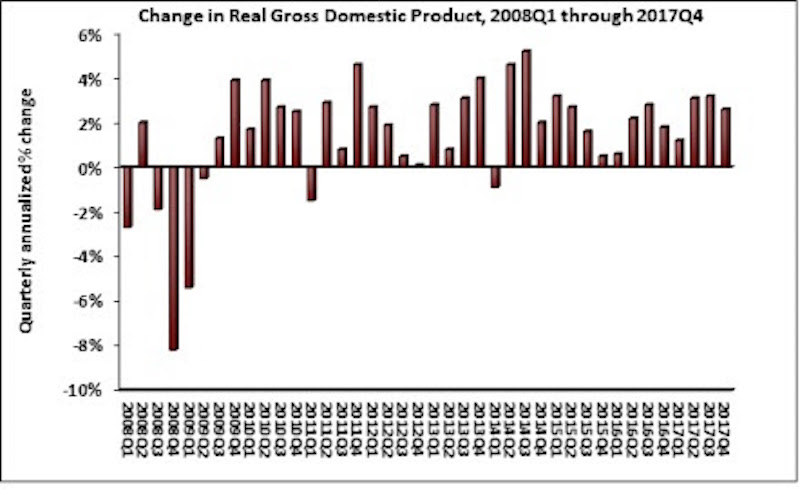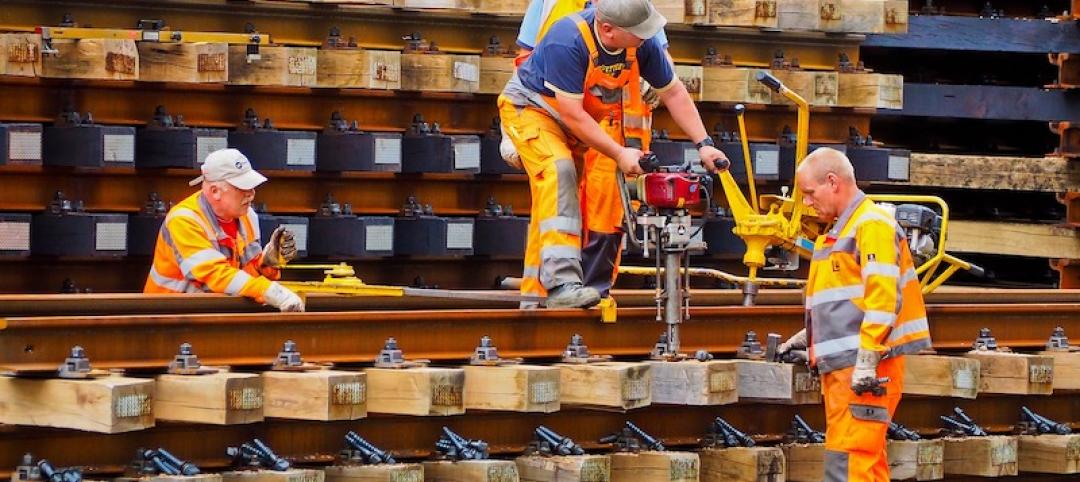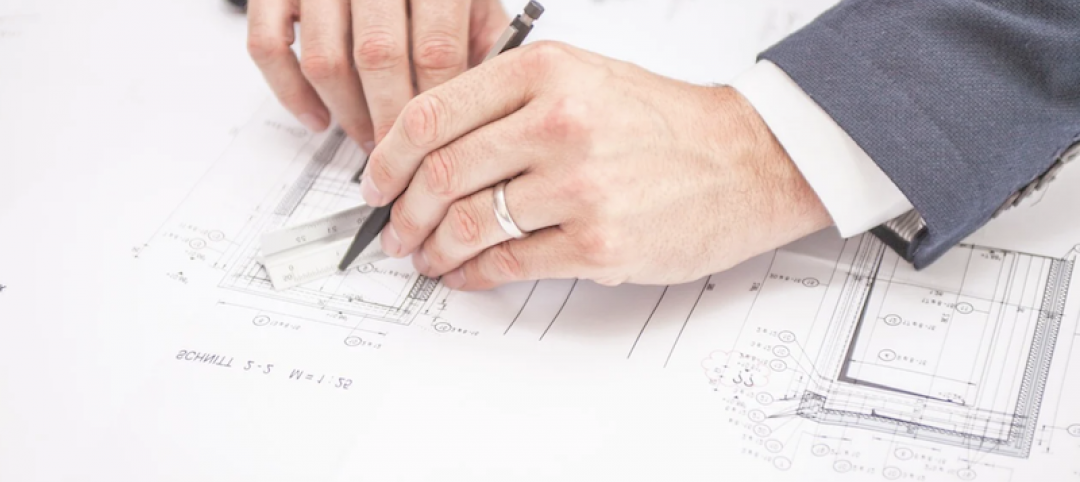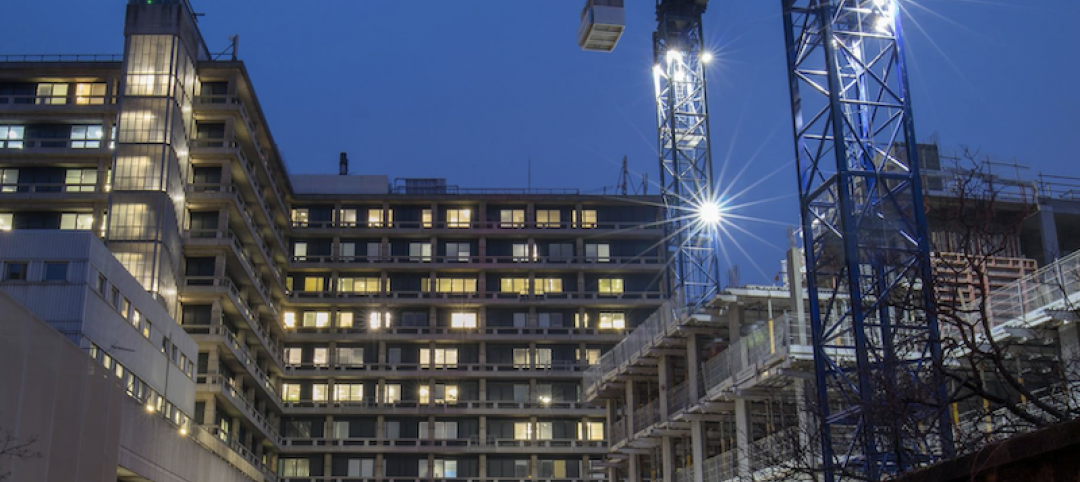The U.S. economy grew by 2.3% in 2017, while fixed investment increased at a annual rate of 7.9%, according to an Associated Builders and Contractors (ABC) analysis of data released today by the Bureau of Economic Analysis.
The economy expanded at an annual rate of 2.6% during the fourth quarter of 2017 after expanding at a 3.2% rate during the third quarter. Nonresidential fixed investment performed similarly to overall fixed investment in the fourth quarter by increasing at a 6.8% rate. This represents the third time in the past four quarters that nonresidential fixed investment increased by at least 6.7%.
The year-end figure for GDP growth of 2.3% is up from 1.5% in 2016 but down from the 2.9% figure posted in 2015. Nonresidential fixed investment increased 4.7% in 2017, its best year since increasing 6.9% in 2014. This followed a 0.6% contraction in 2016.
“Many will look at this report and conclude that consumer spending, the largest component of the economy, drove fourth quarter growth by expanding at a 3.8% annual rate,” said ABC Chief Economist Anirban Basu. “Upon further inspection, however, the fourth quarter consumer spending missed its 3% expectation due to imports increasing at twice the rate of exports. This widening trade deficit subtracted 1.13 percentage points from fourth quarter GDP growth.
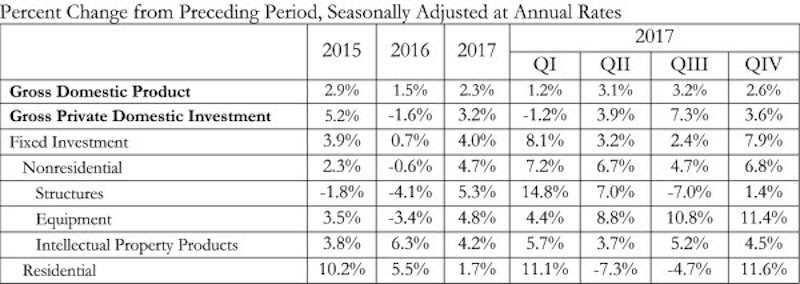
“The factors that have helped to accelerate economic growth in America remain in place, including a strengthening global economy, abundant consumer and business confidence, elevated liquidity flowing through the veins of the international financial system and deregulation,” said Basu. “Stakeholders should be aware that although many companies have announced big plans for stepped-up investment, staffing and compensation—due at least in part to the recently enacted tax cut—the plans have yet to fully manifest within the data. The implication is that the U.S. economy is set to roar in 2018.
“As always, contractors are warned to remain wary,” said Basu. “The combination of extraordinary confidence and capital can fuel excess financial leverage and spur asset price bubbles. The implication is that as contractors remain busy, there should be an ongoing stockpiling of defensive cash. That recommendation will be difficult for many contractors to implement, however, with labor shortages and materials costs rising more rapidly and slender profit margins in many construction segments.”
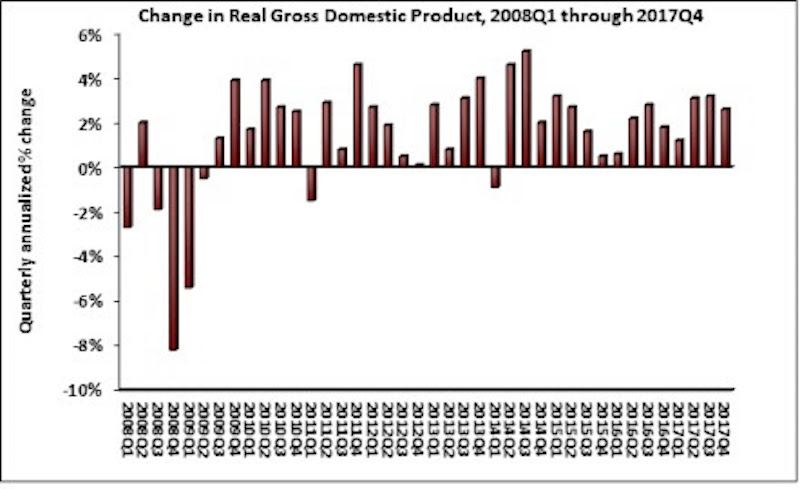
Related Stories
Market Data | Sep 3, 2020
6 must reads for the AEC industry today: September 3, 2020
New affordable housing comes to the Bronx and California releases guide for state water policy.
Market Data | Sep 2, 2020
Coronavirus has caused significant construction project delays and cancellations
Yet demand for skilled labor is high, new survey finds.
Market Data | Sep 2, 2020
5 must reads for the AEC industry today: September 2, 2020
Precast concrete tower honors United AIrlines Flight 93 victims and public and private nonresidential construction spending slumps.
Market Data | Sep 2, 2020
Public and private nonresidential construction spending slumps in July
Industry employment declines from July 2019 in two-thirds of metros.
Market Data | Aug 31, 2020
5 must reads for the AEC industry today: August 31, 2020
The world's first LEED Platinum integrated campus and reopening campus performance arts centers.
Market Data | Aug 21, 2020
5 must reads for the AEC industry today: August 21, 2020
Student housing in the COVID-19 era and wariness of elevators may stymie office reopening.
Market Data | Aug 20, 2020
6 must reads for the AEC industry today: August 20, 2020
Japan takes on the public restroom and a look at the evolution of retail.
Market Data | Aug 19, 2020
6 must reads for the AEC industry today: August 19, 2020
July architectural billings remained stalled and Florida becomes third state to adopt concrete repair code.
Market Data | Aug 18, 2020
July architectural billings remained stalled
Clients showed reluctance to sign contracts for new design projects during July.
Market Data | Aug 18, 2020
Nonresidential construction industry won’t start growing again until next year’s third quarter
But labor and materials costs are already coming down, according to latest JLL report.


